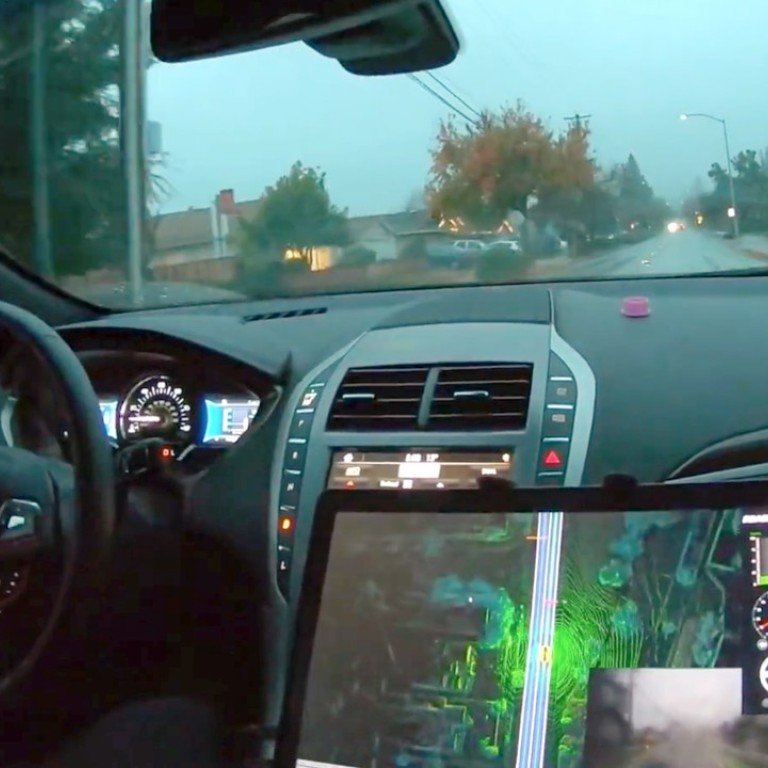
Start-up Roadstar.ai gets record US$128 million funding as autonomous car race with Baidu heats up
The investment raised by the Shenzhen-based self-driving tech company surpassed the US$112 million initial funding round of rival Pony.ai
Self-driving technology start-up Roadstar.ai has raised US$128 million in its Series A funding round, marking the single biggest investment made in an autonomous driving company in China.
The record funding, which was led by Shenzhen Capital Group and Wu Capital, has come at a time when open-road tests of driverless cars have intensified in the world’s second largest economy.
Zhou Guang, the chief scientist at Roadstar.ai, said on Tuesday that the new investment “will be used to bankroll operations of our self-driving fleet and data collection”.
Besides that funding round, Roadstar.ai has launched a software suite called Aries, which enables an autonomous vehicle to drive in the rain or at night with a maximum distance for error of five centimetres, according to a separate WeChat post by the company on Tuesday.
Baidu overtaken by Waymo in US autonomous driving tests
Shenzhen-based Roadstar.ai was founded by three engineers who had previously led the development of autonomous driving technologies at Google, Tesla, Apple, Nvidia and Baidu in California’s Silicon Valley.
It said CMB International Capital and Vision Capital took part in the latest funding round. Early investors included Glory Ventures, Shenzhen Green Pine Capital, Ventech and Yunqi Partners.
Beijing goes ahead with self-driving cars as US reviews safety after Uber crash
In January this year, Roadstar.ai presented a prototype autonomous car, powered by its self-driving technologies, at the CES trade show in Las Vegas.
The funding raised by the company shows how investor interest is heating up in China’s nascent autonomous vehicle sector, where internet search giant Baidu is currently leading the nation’s research and development efforts.
Autonomous driving is one of the areas where China and the United States are competing for leadership, part of a broader contest for supremacy in the next generation of technologies that will revolutionise the way people work, play and live.
The National Development and Reform Commission, China’s top economic planning agency, unveiled in December a three-year plan making the development of smart cars a national priority.
Roadstar.ai joins dozens of other Chinese autonomous driving start-ups, mostly hardware providers, that have emerged over the past two years.
Baidu completes 5G autonomous driving test in China’s new tech city
Its latest funding is larger than that raised by another self-driving tech start-up Pony.ai, backed by IDG Capital Partners and Sequoia Capital, which closed a US$112 million financing round in January this year. JingChi, a tech start-up founded by the former general manager of Baidu’s autonomous driving unit, is reportedly pushing forward its own Series A funding round.
Those start-ups are not only competing in China against the likes of hi-tech giants Baidu, Tencent Holdings and Alibaba Group Holding, the parent company of the South China Morning Post.
Alibaba joins Baidu, Tencent in China’s autonomous car race
They are also in a global race to be among the first companies to commercially develop autonomous driving technology against the likes of traditional carmakers like General Motors, Daimler and Volkswagen, which are investing billions of dollars in this field.
Roadstar.ai, Pony.ai and JingChi are Chinese autonomous driving start-ups which started in Silicon Valley, but are now pushing forward their development efforts on the mainland with the goal of separately introducing robotic taxi services in the country by the end of this year.
‘Godfather’ of hackers is backing this Chinese self-driving car start-up
Their proposed robotaxi services, which will allow users to hail a ride through a booking app, are expected to feature the highest category possible so far, which is Level 4, in autonomous driving tests conducted in China.
SAE International, a US-based professional standards organisation for engineering professionals, has drawn up five levels for autonomous driving. A Level 4 car allows for no driver interaction and can stop itself if the autonomous driving system fails. These vehicles, however, will have functional driving apparatus like wheels, brakes and pedals, so humans can manually drive when needed.
Level 5 cars are completely autonomous, without any steering wheels, brakes and pedals.
Tencent gets green light for self-driving car tests in Shenzhen
Still, official road test data from the US showed that Alphabet’s driverless car division, Waymo, remains far ahead of the competition. Waymo’s self-driving cars recorded only 65 disengagements – when human drivers take over from a car’s self-driving system – between December 2016 and November 2017, when these logged a total of 352,544.6 miles (567,365.5 kilometres), according to data from California’s Department of Motor Vehicles.
Baidu, by comparison, reported that its vehicles had 48 “disengagements” between October 2016 and November 2017 after driving a total of 1,971.7 miles.
The stakes are high for a public roll-out of self-driving cars because the expectation is that autonomous vehicles will be capable of efficiently handling different situations on the road.

